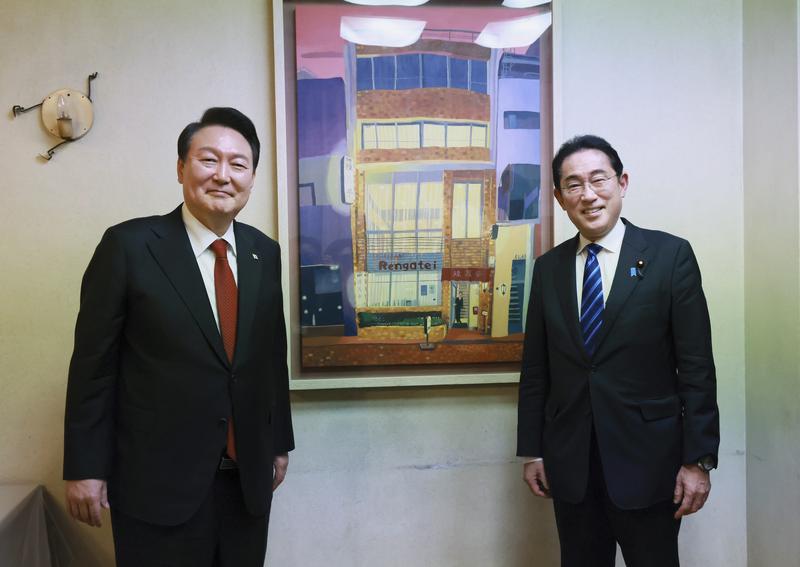 In this photo provided by Japan's Cabinet Public Affairs Office, South Korean President Yoon Suk Yeol (left) and Japanese Prime Minister Fumio Kishida pose for a photo as they visit a restaurant in the famed Ginza district of Tokyo on March 16, 2023. Yoon said on March 21, 2023 he would restore Japan's fast-track trade status after a summit with Kishida last week, a move he called crucial for bolstering supply chains in key areas. (PHOTO / AP)
In this photo provided by Japan's Cabinet Public Affairs Office, South Korean President Yoon Suk Yeol (left) and Japanese Prime Minister Fumio Kishida pose for a photo as they visit a restaurant in the famed Ginza district of Tokyo on March 16, 2023. Yoon said on March 21, 2023 he would restore Japan's fast-track trade status after a summit with Kishida last week, a move he called crucial for bolstering supply chains in key areas. (PHOTO / AP)
SEOUL – The Republic of Korea’s President Yoon Suk Yeol said on Tuesday he would restore Japan's fast-track trade status after a summit with Japanese Prime Minister Fumio Kishida last week, a move he called crucial for bolstering supply chains in key areas.
Yoon announced the decision at a cabinet meeting, saying the ROK and Japan should make efforts to remove obstacles that hinder developing bilateral ties.
Better ties would help build stable supply chains in high-tech industries such as semiconductors by linking the ROK's manufacturing technology with Japan's edge in materials, parts and equipment, the Republic of Korea's President Yoon Suk Yeol said
"I will preemptively order our trade minister today to begin necessary legal procedures to have Japan back on our white list," Yoon told the meeting, which was televised live. "I'm sure Japan will respond if the ROK first starts removing the obstacles."
The ROK and Japan removed each other from the list in 2019 amid a decades-old row over a 2018 ROK court order for Japanese companies to compensate forced laborers during Japan's 1910-45 occupation of Korea.
ALSO READ: ROK, Japan to drop trade row as security concerns trump history
Tokyo criticized the ruling, saying the issue was resolved under a 1965 treaty that normalized relations, and the strained ties fanned concerns over US-led efforts to bolster cooperation to counter the Democratic People's Republic of Korea's nuclear and missile threats.
Yoon, who took office in May, has vowed to mend the bilateral ties and visited Tokyo last week for the first time in 12 years as an ROK leader.
Yoon is pushing to resolve the forced labor feud through a plan unveiled this month under which a public foundation, funded by ROK companies, would pay compensation.
As a follow-up to the summit, Seoul's foreign ministry said on Tuesday it had normalized an intelligence-sharing pact, known as GSOMIA, with Tokyo to foster closer security cooperation on Democratic People’s Republic of Korea
The plan was welcomed in Tokyo but faced a backlash from some victims and ROK opposition lawmakers, who accused Yoon of capitulating to Tokyo and inviting Japanese troops back to the Korean peninsula.
Yoon said that some people would seek political gain by fuelling "hostile nationalism and anti-Japan sentiment," without naming them, but that it was irresponsible to do so as the president.
He also accused his predecessor's government of leaving relations in a "quagmire" at the expense of crucial economic, security and people-to-people exchanges.
READ MORE: In reciprocal move, China halts ROK, Japan visas
"I felt like I was trapped in a maze with no exit, but I couldn't just sit back and watch," Yoon said.
Kishida told him at the summit that he would uphold Japan's past apologies for wartime atrocities, including a 1998 declaration focusing on colonial rule, Yoon said, adding that now is the time for the two neighbors to go beyond the past.
"The relationship is not a zero-sum one where one side gains and the other side loses as much. It can and must be a win-win," he said.
Better ties would help build stable supply chains in high-tech industries such as semiconductors by linking the ROK's manufacturing technology with Japan's edge in materials, parts and equipment, he said.
The US has called for greater trilateral cooperation with its key two Asian allies on economic security.
As a follow-up to the summit, Seoul's foreign ministry said on Tuesday it had normalized an intelligence-sharing pact, known as GSOMIA, with Tokyo to foster closer security cooperation on the DPRK.


